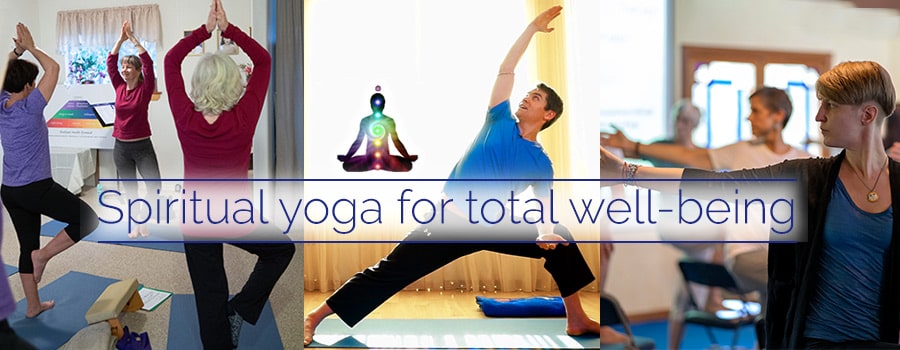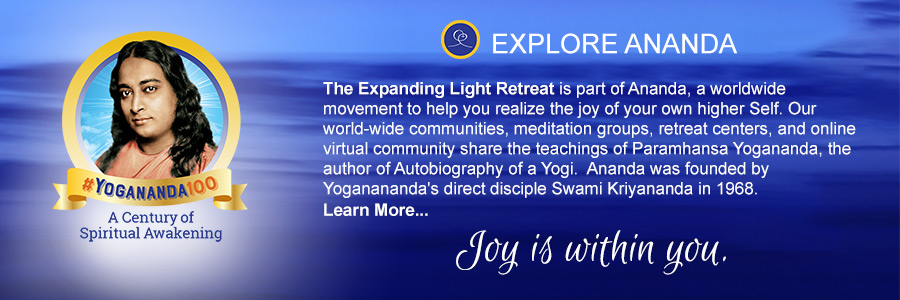|
This article was written for the Ananda Yoga® Teacher Association newsletter. Learn more, or find a certified Ananda Yoga® teacher near you. |
Getting the Point
Have you ever reached a point with your sadhana — or in your teaching, or in anything else from which you seek fulfillment — where it just wasn’t giving you what you wanted? Did you think, “What’s wrong; why isn’t there more joy”?
Of course you have. Everyone has.
But what can we do about it? I’d like to share with you a couple options that have helped me on a number of occasions — including a recent one that spurred me to write this article. The good news is, they’re easy.
None of My Business
When I’m stuck, I sometimes let it go for a while, thinking it might work itself out. If it doesn’t, I often tinker with my practice: longer meditations, different pranayamas, fewer asanas, more chanting, shorter meditations, harder asanas, more Savasana, etc. Occasionally this works.
“Letting it go” has worked remarkably well for me over the years with machinery — amazingly, mechanical things often “fix themselves” — and sometimes with sadhana, too. And tinkering with my sadhana, making little “technique tweaks,” can once in a while produce changes that seem to get me moving again.
Overall, however, this is not a great strategy. Granted, sometimes we’re experiencing such a “karmic bomb” that waiting for our practice to improve is about all we can do. But too often it’s just a waste of time — and haven’t we wasted enough time already? And the problem with technique-tweaking is that it often doesn’t address the cause of the problem, which therefore resurfaces later.
It’s far better when I realize that the real operative factor is my attitude, and that often my attitude has been wrong: I’ve been doing my sadhana based on what I get out of it. And while we can’t avoid some of that attitude — why else would we practice? — we risk defining our practice in terms of whether it pleases us, instead of whether it pleases God. This is “merchant consciousness.”
Here we come to that central principle of karma yoga: nishkam karma, action without desire for its fruits. As much as we want to experience divine bliss, eternal love, fathom-less peace, and all that other good stuff, they are none of our business.
Why? Because they are the fruits of spiritual practice — and the fruits of all action are God’s business, not ours. As Sri Krishna told Arjuna in the Bhagavad Gita: “You have no right to the fruits of your actions. Your only right is to action itself.”
In other words, our business is what goes into our practices, not what comes out of them. I used to hate this idea. “Why act at all, if I can’t influence the outcome?” Confessions of a control freak.
Now, however, I find this idea very freeing. It’s the reverse idea — ”the fruits of our practice are up to us” — that’s painful, because then when we compare bliss, love, etc., with what we actually experience, it can be utterly discouraging: “I can never do that!” Now that’s pain.
Greater minds than ours have had the same thought. In the Gita, after Krishna gave Arjuna the teachings of yoga, and told him of its sublime qualities — complete mental tranquility, sense-transcendent bliss, immunity to every sorrow — Arjuna’s responded: “But Krishna, I do not experience those high states. My mind is so restless, chaotic, powerful, obstinate — it’s like trying to master the wind!” (Who among us cannot relate to that?!)
Krishna’s response was: “True, that’s the nature of the mind. But you can master it — by sadhana and by dispassion.” Dispassion, in part, toward the results of your own sadhana. Why worry about something that’s none of your business in the first place? Let’s think instead: “Yes, I never can do that, because it’s not my job. My job is only to make a quality effort; the results are up to God.”
What a relief! So when I’m dissatisfied with my practice, ask myself, not “What am I not getting?” but “What am I not giving?” It’s usually quite easy to find an answer, and to make a helpful correction, such as:
-
Be more fully present — Letting the mind roam among all my projects, obligations, and fantasies is not a spiritual practice. A quality effort begins with staying engaged with what I’m there to do.
-
Be enthusiastic — Do I look forward to my practice, or has it become dull routine? Let me make each asana, breath, or kriya an experience to savor, rather than simply “counting down” until the practice finally ends.
-
Practice with gratitude — Here I am, practicing techniques that can set me free. Might I not practice with gratitude to God, the source of those techniques?
-
Be self-giving — The lover seeks to please the beloved, not himself. What a beautiful attitude for sadhana! — How can it help but draw God’s grace and companionship?
-
“Prime the pump” — Do I bring into the practice whatever I can manage of the states that I seek — practicing with whatever joy, or love, or peace I can manage, and eagerly anticipating even more of those states? This is a powerful application of the law of magnetism to spiritual practice: the more you can be like that which you seek, the more you’ll be able to experience it.
All these are very down-to-earth matters. We can manage them if we’re willing (granted, that is sometimes a big “if”), because they are our business.
We Don’t Have to Be Alone in This
Understanding what is our business is worth a lot, but if we stop there, we can depend too much on personal effort. Yes, personal effort is important, but unless we’re very advanced spiritually, we need help from additional sources.
Herein lies the importance of satsang, spiritual companionship (literally, “fellowship with truth”). Being with like-minded, spiritually sincere people can uplift you, even without you doing much; their magnetism will help increase your own magnetism. And if you add to that your own conscious efforts, the result is even greater.
All authors are graduates of Ananda Yoga Teacher Training.





















